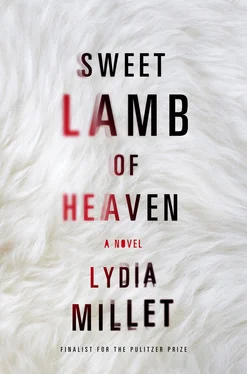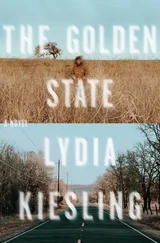I was standing in sand, sand that used to be an ocean and would be ocean again. I stood on the edge of the city as dust rose from the falling buildings. But these buildings were made out of words, locked into each other like bricks and beams — small words, minuscule words, inscrutable as seams.
Ned was coming, flying in from the west. His advent turned the distant sky black. Before him he whipped up a slave army, a crowd of gruesome flying things that drove billions of insects before them, clearing a path. The cloud was made of words too but the words were deformed, they meant confusion or blankness or insidious poison. What light filtered through them was cadmium yellow and leaked a slow disease.
I HAVEN’T SLEPT well lately; I often sit staring at the screen of my laptop while Lena and Will are sleeping. I sit there and stare as the screen resolves into dull letters or right angles of light and fades into disinterest again. It was open to my inbox and at some point I noticed, on the left panel of the page, that my spam folder said 172. I clicked on it and was about to Delete all spam messages now when I saw, buried between an Enlarge Your Manhood and Hot Women in Your Neighborhood, another email from Kay.
I felt sick for a second, scared it was a suicide note or a goodbye letter — so sure I sat there for a long time gazing out Solly’s window at the yellow and white squares in the buildings, tall rows of windows rising into the night sky. It’s a sight I’ve always loved, assumed everyone loves: columns of lights in tall buildings at night in the city. Beneath them was the irregular black solid of the park’s treetops.
Finally I looked back at the screen and it wasn’t as dire as I’d thought. The date and timestamp were there as always, on the right: Kay’s message hadn’t been sent the day she took the pills; it had gone into my spam folder two days before.
Still, five more minutes passed before I was willing to click on it. I sat on and on at Solly’s desk, counting the rows of yellow squares hovering midair, wondering what forms of life moved in the darkness of the park below.
The problem is, now, were going to be nothing BUT surface language. & no safeties, no backups, no checks & balances. The future is nothing butlanguage, see, not languageS but language. Monolithic. The little ones are dying off @lightning speed. Programming Language, ad talk, 1 speech for all, a juggernot, that’s where we’re going Anna. All the native languages dead, all we’l have left is shells & false things & tongues spoken for profit &/or by machines. Don’t u c Anna thisis the tru end of God. When everything that lives the deep language dies. This is the end of God and not the fake god made up to look like us, not that fake god anna, the realgod, the god tht IS evolution & speciation & Life, a god that did make the world, u see? — b/c this god isthe beautiful unconscious, it is billion processes & intuitions under all of biology & personality & art, the thousands and millions of cultures of both Man and Beast. We’re killing that deep god ana, the speakers of false language are suffocating the deep, they are the oil on the water beneath which all suffocates & dies
Satan is God weaponized
God weaponized by man
Now is the point of danger b/c true language is the Soul Anna, tru deep language the soul & the soul can be ruined. God needs us Anna, as much as we need god
I WONDER IF Ned’s allies are mostly true believers or, like him, mere opportunists.
Will believes, like Don with his geese and songbird migrations, that I found my way to them via some kind of homing instinct, since a couple of others over the years have showed up without prior contact. He thinks it’s part of the background orchestration of the deeper language, an urge that underlies our patterns of survival.
It isn’t that I learned nothing at the motel, only that as soon as I learned it I seemed to always have known it, yet still feel I know nothing at all. Burke with his speaking tree, Linda with her theme-park whale, Kay with Infant Vasquez — I picture Burke’s maple in its arboretum, planted halfway across the world from where it evolved, a lone specimen with a plaque in front of it bearing its names, both Latin and common. So unlike the aspen that grew not far away from that arboretum — those cloned aspen, connected underneath the earth, that lived as one for what could be millennia. . I watch a pigeon strut around on Solly’s windowsill, dirty but free, and wonder about the orca in its pool, its home only twice the length of its body.
They did have something in common, all those the voice spoke through: they were captives. Even Infant Vasquez, who quickly died, or Lena, who lived on and spoke. All infants are kept creatures, after all. I remember how snatches of poetry were given out to unfortunates when we passed them; I think of prisoners and victims and martyrs, the persistent notion of their closeness to God. I think of how a tinge of the divine rests on the hurt or unfortunate, how so many of them wear a kind of halo of gilded pity.
But if the injured and wretched are closer, what does it point to? Likely we give the poor and weak and sick their halos reflexively, I think, to make it easier to detach from them and not have to do fuck all. We give them sympathy in the place of help. We say they’re not like us, they’re sanctified and only half-human. They might as well be on a cross.
I recall acutely how abjection makes you a part of a herd. The kidnapping left me feeling robbed, not just of my assumptions about freedom but of my personality — no one has personality when their leg’s being amputated, no one has personality when their eye’s being poked out. You don’t have any selfhood when you’re suffering extremely: in suffering you could be anyone. Whether that makes you everyone , though, is a different question.
And I don’t like the proposition that suffering puts us closer to each other. That suffering isolates the sufferer — this is equally valid.
So Will has comforted me over Kay. He’s trying to be kind, of course, and I’d do the same if our positions were reversed, you don’t question the rightness of trying to comfort someone. As behaviors go, it’s universally acclaimed. Yet he told me there wasn’t anything I could have done, when in fact there was: I could have done more than nothing.
I think of the duress that can be brought to bear on a soul, how selfhood, which we depend on so completely, is a luxury good.
I turn my palms up reflexively, thinking of those who suffer their whole lives. As though the gesture would make me one of them.
WE LEAVE SOON, after one last hypnosis session. Kay has been moved to a hospital in Boston, near where her parents live. We will visit her there on the way to see my parents.
LYING IN THE RECLINER I found myself walking along an institutional hallway, following green footsteps on the white floor — the footsteps were color-coded to the different wings and there were colored lines along the ceilings, too. I walked with deliberate steps until I came to a room.
An older woman sat in a chair, knitting with blue-gray yarn. The nightstand was crowded with propped-open cards. But instead of lying inert in her coma, Kay hovered above the bed. Her levitation had a Buddhist quality — though her posture was comfortable, not a straight-backed, cross-legged stance as in meditation or yoga. She slumped a bit, relaxed, and remained in the air smiling down at me, with a serene quality that’s rare inside the confines of real life.
I wanted to rise to where she was, but I couldn’t, so at an angle from each other, she high and me low, we gazed out the window. Out there was the crumbling city of words, much as I’d seen it before, though farther in the distance, dust rising from its slow-motion collapse. Kay nodded and stared. Her face had a kind of shining, imperturbable sadness like a bronze statue in a park, somehow civic.
Читать дальше












